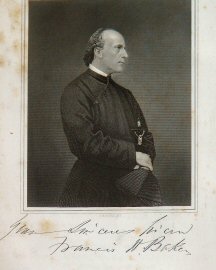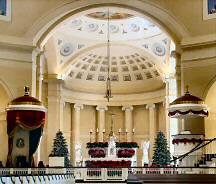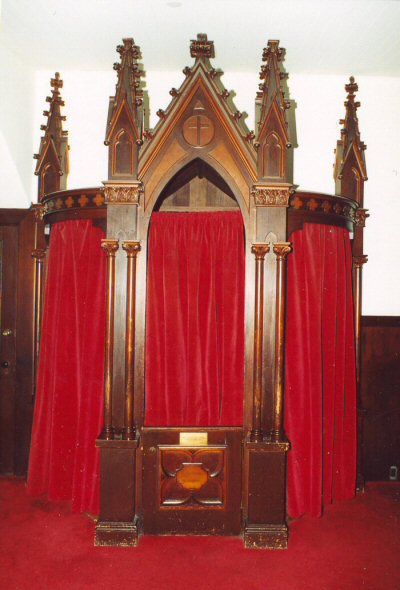The Sermons of Rev. Francis A. Baker
Home
 Francis A. Baker
was born in 1820 the son of Dr. Samuel Baker, a well-known physician and
lecturer at the University of Maryland. Dr. Baker was a great admirer of
Francis Asbury, a popular Methodist bishop at that time, and chose to name his
son
after his friend. Francis attended Princeton College, but didnít practice
any one religion until later when he became an Episcopalian. Then he began
his studies to become a
minister in the Episcopal faith which is the American branch of the English Anglican faith.
Francis A. Baker
was born in 1820 the son of Dr. Samuel Baker, a well-known physician and
lecturer at the University of Maryland. Dr. Baker was a great admirer of
Francis Asbury, a popular Methodist bishop at that time, and chose to name his
son
after his friend. Francis attended Princeton College, but didnít practice
any one religion until later when he became an Episcopalian. Then he began
his studies to become a
minister in the Episcopal faith which is the American branch of the English Anglican faith.
He
had great respect for the ideals held by John Newman who led the Oxford Movement
in England, and was drawn toward the Faith of the Catholic Church because of his
attraction to the presence of the Holy Eucharist. Still, he viewed his own
Episcopal ministerial responsibilities as an opportunity to re-establish the
inter-communion which had existed in the Roman and Greek Churches before the
schism which had earlier divided the churches into those of the East and West.
He
was ordained an Episcopal deacon in 1845, and preached his first sermon at St.
Paulís Church in Baltimore. His quiet, unassuming character did not prepare his
hearers for his power as a preacher and soon it was generally believed that Mr.
Baker was the best preacher in Maryland. His ordination as an Episcopalian
priest soon followed in 1846.

Mr.
Baker believed that all Christian Churches shared an equal Catholic unity and
believed they should unite within the claim of the Roman Church to be the one Holy Catholic
Church. But not many shared his convictions, and over time as this belief
became stronger, he resigned from his priestly parish duties in 1853 and began
to receive instructions to enter the Catholic Church. He was accepted into
the Church when he was 33, and joined the Redemptorists, a missionary society.
After more study as a novice was
ordained a priest in 1856 in the Baltimore, Maryland Cathedral.
Then
as well as today, there was a great need in the United States for missions to be
held in its cities and larger towns.
 For many, work started early in the morning and ended
late at night. The Redemptorists presented week-long missions so that regular parish members and especially the poor
could receive the religious instructions given by these traveling preachers. Their
missions proved so popular in New York that the Cathedral and
nearby streets were often filled with thousands. Large numbers of people stood
in line for Confessions which were heard from 4:00 a.m. until late into the
evening. Sometimes people waited to receive the sacrament who had not confessed
in 20 years. It was felt that there were so many others who could benefit from this particular
kind of spiritual assistance, that Francis Baker and several other Redemptorists formed the Congregation of the Missionary Priests of St. Paul the
Apostle, known today as the Paulist Fathers. Their intent was to announce and explain
the Catholic Faith to the world by their prayer, good example and the grace of
God.
For many, work started early in the morning and ended
late at night. The Redemptorists presented week-long missions so that regular parish members and especially the poor
could receive the religious instructions given by these traveling preachers. Their
missions proved so popular in New York that the Cathedral and
nearby streets were often filled with thousands. Large numbers of people stood
in line for Confessions which were heard from 4:00 a.m. until late into the
evening. Sometimes people waited to receive the sacrament who had not confessed
in 20 years. It was felt that there were so many others who could benefit from this particular
kind of spiritual assistance, that Francis Baker and several other Redemptorists formed the Congregation of the Missionary Priests of St. Paul the
Apostle, known today as the Paulist Fathers. Their intent was to announce and explain
the Catholic Faith to the world by their prayer, good example and the grace of
God.
His
first mission sermon was preached in 1856 at St. Patrickís Church in Washington,
D.C. and was entitled, ďThe Necessity of Salvation.Ē Near the close of this
mission, President Franklin Pierce and his wife arranged for a bouquet of
flowers to decorate the altar at its Dedication to the Blessed Virgin.
Francis
and his fellow Paulists preached many missions throughout the South, East,
and the mid-West. Their missions in New York, Maryland, and New Jersey
strengthened the faith of hundreds of thousands and caused the conversion and
baptism of many. On one occasion in Ann Arbor, Michigan, interest in their
mission was
so great that some farm families walked and traveled by cart from up to twenty miles to attend.
But the crowd that gathered was so large that instead of turning away, the sturdier ones
climbed into the trees outside the church to listen to the preaching through the open windows.
Mission
schedules were very demanding. Francis usually said Mass at 5 a.m., after which
he heard confessions until 7:30 in the morning. Then he returned to the
Confessional at 9 a.m., and stayed until 1:00 in the afternoon. Confessions
started again from 3 p.m. until 6:30 p.m. From 7:30 p.m. on the days he was not
preaching, he would gave instruction in the faith and lead the prayers before the sermon at
the evening Mass. After the Mass he again instructed adults and converts.
All
this missionary work was often carried out in very harsh working conditions.
Everyone suffered from the extreme cold or heat, there was no ventilation, there
was little opportunity to exercise or to rest, and the voice was often strained
as the message had to be heard by the hundreds and even thousands of attendees. His eight year career of missionary labor
compared well with the usual European standard of ten years in the field of evangelization. He
drew his strength from his devotion to the Blessed Sacrament, the Blessed Mother,
the saints, and to the mysteries of the Christian Faith symbolized by the
outward forms of religion.
After
time, while working under these conditions, he developed throat problems and
gradually gave over his preaching to others. He developed typhus and pneumonia
and died quietly at the age of 45 surrounded by his loving friends. He was
buried in St. Patrickís Cathedral in New York in 1865, just several days before
the Friday of Holy Week when President Lincoln was assassinated.
Click
on the list below to read Rev. Francis Bakerís sermons and discover what attracted so
many listeners to the message of this gentle yet forceful early American
preacher.
Top
Home
Mission
Sermons
01
The Necessity of Salvation
02
Mortal Sin
03 The Particular Judgment
04 Heaven
Sunday Sermons
01
The Duty of Growing in Christian Faith - First Sunday of Advent
02
The Mission of St. John the Baptist - Second Sunday of Advent.
03
God's Desire to
be Loved - Christmas Day
04
The Work of Life -
Third Sunday before Lent
05
The
Failure and Success of the Gospel - Second Sunday before Lent
06
The Church's Admonition to the Individual Soul - Ash Wednesday
07 The Negligent
Christian - Third Sunday in Lent
08
The Cross,
the Measure of Sin - Passion (Palm) Sunday
09 Divine Calls
and Warnings - A Lenten Sermon
10 The Tomb of Christ, The School of Comfort - Easter Sunday
11 St.
Mary Magdalene at the Sepulcher - Easter Sunday
12 The Preacher, the Organ of the Holy Spirit - Fourth Sunday after Easter
13 The Two Wills in
Man - Fourth Sunday after Easter
14 The Intercession of the Blessed Virgin, The Highest Power of Prayer - Sunday
within the Octave
of the Ascension
15 Mysteries in
Religion - Trinity Sunday
16
The Worth of the
Soul - Third Sunday after Pentecost
17
The Catholic's Certitude Concerning the Way of Salvation - Fifth Sunday
after Pentecost
18 The Presence of God
- Fifth Sunday after Pentecost
19 Keeping
the Law Not Impossible - Ninth Sunday after Pentecost
20 The Spirit of
Sacrifice - Feast of St. Laurence, Martyr
21 Mary's
Destiny a Type of Ours - Feast of the Assumption
22 Success the
Reward of Merit - Fifteenth Sunday after Pentecost
23 Care for the Dead
- Fifteenth Sunday after Pentecost
24 The Mass
the Highest Worship - Twenty-First Sunday after Pentecost
25 The Lessons of
Autumn - Last Sunday after Pentecost
Top
Home
 Francis A. Baker
was born in 1820 the son of Dr. Samuel Baker, a well-known physician and
lecturer at the University of Maryland. Dr. Baker was a great admirer of
Francis Asbury, a popular Methodist bishop at that time, and chose to name his
son
after his friend. Francis attended Princeton College, but didnít practice
any one religion until later when he became an Episcopalian. Then he began
his studies to become a
minister in the Episcopal faith which is the American branch of the English Anglican faith.
Francis A. Baker
was born in 1820 the son of Dr. Samuel Baker, a well-known physician and
lecturer at the University of Maryland. Dr. Baker was a great admirer of
Francis Asbury, a popular Methodist bishop at that time, and chose to name his
son
after his friend. Francis attended Princeton College, but didnít practice
any one religion until later when he became an Episcopalian. Then he began
his studies to become a
minister in the Episcopal faith which is the American branch of the English Anglican faith. 
 For many, work started early in the morning and ended
late at night. The Redemptorists presented week-long missions so that regular parish members and especially the poor
could receive the religious instructions given by these traveling preachers. Their
missions proved so popular in New York that the Cathedral and
nearby streets were often filled with thousands. Large numbers of people stood
in line for Confessions which were heard from 4:00 a.m. until late into the
evening. Sometimes people waited to receive the sacrament who had not confessed
in 20 years. It was felt that there were so many others who could benefit from this particular
kind of spiritual assistance, that Francis Baker and several other Redemptorists formed the Congregation of the Missionary Priests of St. Paul the
Apostle, known today as the Paulist Fathers. Their intent was to announce and explain
the Catholic Faith to the world by their prayer, good example and the grace of
God.
For many, work started early in the morning and ended
late at night. The Redemptorists presented week-long missions so that regular parish members and especially the poor
could receive the religious instructions given by these traveling preachers. Their
missions proved so popular in New York that the Cathedral and
nearby streets were often filled with thousands. Large numbers of people stood
in line for Confessions which were heard from 4:00 a.m. until late into the
evening. Sometimes people waited to receive the sacrament who had not confessed
in 20 years. It was felt that there were so many others who could benefit from this particular
kind of spiritual assistance, that Francis Baker and several other Redemptorists formed the Congregation of the Missionary Priests of St. Paul the
Apostle, known today as the Paulist Fathers. Their intent was to announce and explain
the Catholic Faith to the world by their prayer, good example and the grace of
God.